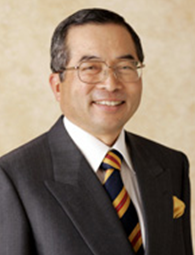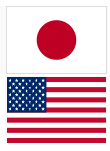Japanese Reactions and Opinions
While on the road, whether it was in Mexico, Greece, or Japan, we strived to not only focus on our perspective of the country, but also to study how the inhabitants view the United States. Our travels have led us to believe that you haven’t completely explored a foreign land until you connect with the people that live, work, and thrive there.
Every day brought new experiences: visiting corporations in modern Tokyo, hiking through the mountains of Yunomine, visiting the Nijo Castle in Kyoto, bicycling to the dormant volcano of Hagi, preparing cold Soba noodles in the Alps. And as we made our way through our travels, we took every opportunity to converse with those who crossed our paths. What we found is that, as a whole, the Japanese are one of the most courteous and polite cultures. They are willing to go out of their way for the sake of others. They are endlessly hospitable and admirably content with their lives.
Below we have highlighted, with their permission, our most significant interactions with some of the people we met during our studies. The conversations we shared brought us a step further out of Americentrism and heightened our understanding of the world view.

Dr. Sachio Semmoto
Sketch: As the CEO and founder of eAccess and eMobile Ltd, Dr. Semmoto is a prime example of realizing both the American and Japanese dream. With a Ph.D. from the University of Florida College of Engineering, Dr. Semmoto achieved his many successes by working from the ground up.
During a half hour meeting, Dr. Semmoto described the dynamic corporate environment of eAccess, asserting that it was modeled largely on corporate America. The company’s large base of young professionals provides greater energy and productivity for the company. Additionally, the 7 – 11 workforce, comprised mainly of men aspiring to climb the corporate ladder, is a thing of the past. Today, progressive businesses are employing a more diverse workforce including more females. The day we met, Dr. Semmoto was just about to announce the new female chief financial officer of the company.
When asked about the United States when it comes to the world stage, Dr. Semmoto responded:
Although I am a great fan of the U.S., the U.S. generally lacks the global view and thoughtfulness to other countries, since your domestic issue is already huge.
However, considering the growing tremendous presence of both China and India for the coming twenty years, the US must become more aware of others, otherwise the U.S.'s position might become endangered.
As a friend of the U.S., I will promise to support the U.S. whatever I can do but also you all the selected elite should have broader interest and pursue more studies in other areas of the world, especially growing Asia Pacific.
As students, Dr. Semmoto urged us to take advantage of every single opportunity given. He emphasized that life is about taking risks and to never be afraid to do just that. His wisdom comes from great experience: at age 65, Dr. Semmoto launched eMobile Ltd, the sister company of eAccess, which has become a leader in mobile broadband throughout Japan.
Mr. Hiroshi Tanaka
Sketch: Director of Research and Development for Hakuhodo, Japan’s second largest advertising firm, Mr. Tanaka graduated from the University of Florida Institute of Food and Agricultural Sciences (UF IFAS).
Mr. Tanaka warmly received our group and presented the current methods of consumer research in relation to advertising and marketing as well as incorporated some of his own life lessons. Mr. Tanaka spoke of two kinds of “Aha!”
1. To find the common structure for strategy
2. To respect difference
Another suggestion of his included to enlarg our “encounter circle.” He went on to emphasize the importance of not only networking, but also keeping in touch with coworkers. Mr. Tanaka was a firm believer in experiencing the broad spectrum of life and maximizing the opportunities that exist to do just that.
Calligraphy Artist
Sketch: A trip to Fujimi in the Nagano Prefecture for calligraphy immersion brought us in touch with one of the wisest and most inspirational persons we met on our travels. Renowned for her mastery of the art form, cense patiently instructed us novices. Unable to speak English, her teachings were simple yet didactic: she would paint by example and expect us to follow her lead. She corrected us by bracing our hand and guiding our brush on the rice paper. She approved of our creations with a beaming smile, a twinkle in her eyes, and a clap of her hands.
At the end of the day she commented on the day’s progress: She had felt deep inside her that she has all taught us before in another time. She spoke of how the clear complexion in our faces and glowing eyes radiate a youthfulness and vigor that doesn’t seem to exist among the Japanese youth. With this, she conveyed, Americans appear more motivated to learn and have a greater aspiration to succeed than do the Japanese. Above all, she understood our radiance at its core and said it signified our blessed minds and pure hearts. We will never forget the kind, genuine words from cense.
Mr. Saburo Hammamoto
Mr. Hammamoto eagerly approached us at Nachi Waterfall in the Wakayama prefecture. Anxious to meet Americans, he openly explained how much he enjoyed talking to foreigners and has visited the United States on many occasions. He has traveled to Los Angeles, Niagara Falls, Washington, and New York City on both business and leisure. Mr. Hammamoto explained that his travels were always enjoyable and that Americans he met were very friendly and hospitable. When asked about his views of the United States, he expressed a strong approval of Japanese-U.S. relations and commerce, explaining that the company he owned had many healthy relationships with American businesses. He added that Japanese-U.S. commerce is a highly mutual relationship that not only brings greater economic stability and growth, but also reinforces diplomatic relations.
Hitotsubashi University Students
Sketch: We spent a half day in the life of students from a university that lays in the outskirts of Tokyo. Between campus tours, class presentations, and dining in the college town, the students conversed with us on a wide range of topics. Most importantly, we asked about their views on America and American pop culture.
As we have encountered throughout many of our travels, the students equated the United States and its people with the policies and leadership of President Bush, who they did not appear to support. This skepticism was mainly a result of the War in Iraq. We attempted to clear up this misconception by explaining that American sentiment about Bush is mixed, and the president does not necessarily convey the sentiments or desires of the American people. We also emphasized that as a leaders of the free world, it is up to countries like ours to protect and secure freedom across the globe and that any acts to the contrary become a threat to democracies like our own. The students logically qualified our point adding that as long as our decisions are justified with evidence and not based on rash assumptions, then they are in full agreement.
We went on to discuss the candidates for the Presidential race of 2008. When the names of Hillary Clinton and Rudy Giuliani were mentioned, the students expressed a great admiration for Giuliani and the way he handled the events surrounding September 11. They felt like he was a hero to the American people as well as to the rest of the world and would easily win over Hillary Clinton, for whom they expressed little faith in her ability to lead the country.
We asked: When you think of America, what comes to your mind? They amusingly answered: McDonald’s hamburgers and Disney World.
The students also expressed how much adolescents and college students their age look up to American pop culture and habits. They explained how in past generations, Japanese parents were extremely strict and believed in regimenting their children with plenty of discipline. In recent years, as globalization and global marketing have surged, parents have become more open minded to giving their children greater freedom. Consequently, behaviors and habits of Japanese adolescents and young adults are very similar to those in the United States. Adolescents engage in the same kinds of entertainment, wear fashionable, brand name apparel, and start dating in their early to mid teens. While day to day practices may parallel American youth, it should be noted that the degree to which the Japanese value and focus on their education appears greater than that in the States.
Mr. Koji Imazausa
Sketch: As a computer engineer working on chip technology, Mr. Imazausa decided to join us on our day’s activities. During the train ride to Hitotsubashi University, we shared some interesting conversations on his perspective of America and his life in Japan.
Our conversation began with a discussion of the War on Terrorism. He expressed mixed sentiments about the war: While he felt that ensuring freedom and democracy is an important mission, he sees the United States as a superpower that believes it has the ability to control the world stage. He described the United States government as having a selfish mindset and overbearing attitude that often fails to take into account the viewpoints and opinions of other countries. He was adamant in that the United States needs to forge stronger relationships with other countries in order to rid its Americentric motives and appear less isolated on the world stage. When it came to Japan’s involvement in the War, Mr. Imazausa said that Japan’s small military was deployed to Iraq to assist in the situation, but their work deals primarily with engineering projects to rebuild and restore war-torn towns and cities. Even so, the Japanese consensus is for all Japanese troops to be withdrawn from the region.
He believes that U.S.-Japanese foreign relations are strong and that both countries fuels the other’s economy as a result of the wide exchange and trade of technological and automotive products in addition to other business dealings. He took a great liking to American innovation and the contributions they have had in Japan. He affirmed that corporations like Intel, Microsoft, and Texas Instruments have served as superior role models in the technology industry, not only from the quality of their products, but also in their operations. Consequently, such companies create stiffer, but healthy competition in the Japanese markets.
We also managed to talk about how the United States has shaped the lack of military and defense in Japan. Mr. Imazausa explained that post World War II, Japan agreed with the United States that they would not build up forces and also documented this agreement in their own constitution. During the latter half of the 20th century, the Japanese relied extensively on U.S. military power to protect them from any potential threats. In an ever-changing political and global climate, the Japanese now feel unprotected and vulnerable that they lack a sufficient defense system. While we were visiting the country, steps were underway to pass an amendment permitting the revising of the constitution to allow for such a change.
